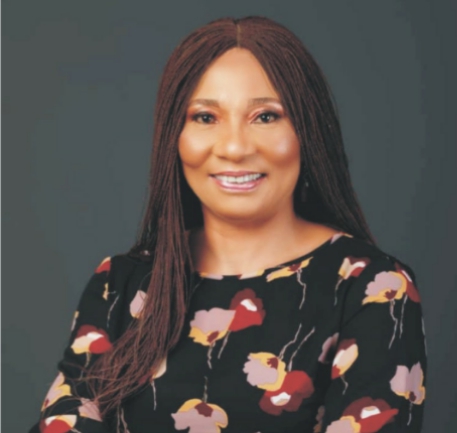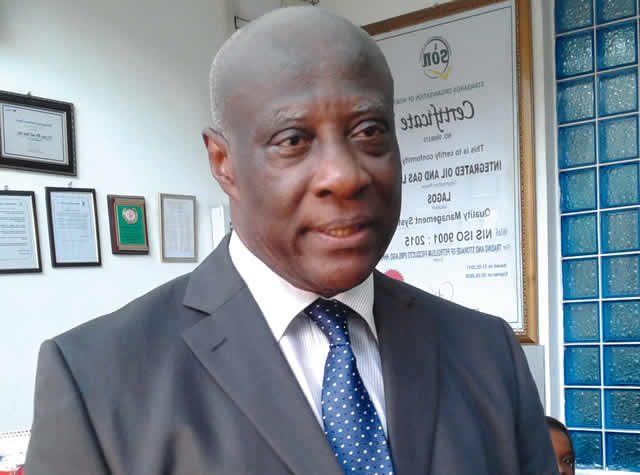2016: How To Grow The Economy – Johnson Chukwu

Mr. Johnson Chukwu is the Managing Director, Cowry Asset Management Limited in this exclusive interview with MMS Plus Weekly, he analyzes the 2016 budget of the Federal Government and the assumptions on which the budget was predicated given the present economic realities in Nigeria. He equally gave prescription for economic growth. Excerpts…
Since the government of President Mohammadu Buhari came into power in May 2015, all we hear about is fight against corruption, we were not told about how the last part of the budget performed before we talk about 2016 budget. How do you think this will affect the economy?
Last year was basically dominated by political activities; because we saw an election period, the change of baton in leadership at the national and also state levels, then we also witnessed a long period of waiting for the appointment of cabinet members. Those must have impacted negatively on economic activities. So it may be difficult to say what to expect from the policy direction of the government.
The Gross Domestic product (GDP) is an empirical result of the outcome of the economic activities of the country. The GDP figure of the second quarter of 2015 was at 2.5 percent and 2.84 percent in the third quarter, this suggests that we may have ended that fiscal year at the GDP growth rate of about 3 percent or 3.5 percent. That is a measure of what the economy achieved in 2015, it was a year dominated by economic activities that was worsened by the drop in oil price which may have affected the government capacity. Both the outgoing or incoming government were all distracted by political activities.
How do you see the 2016 budget, is it a viable budget for the economy?
The principle on which the budget is predicated is sound, in the sense that government wants to implement an exceptional budget initiative and then use that to pump money into the system to trigger economic recovery but the basic assumption of the budget is an assumption that will be difficult to realize. I will mention a few of them; the government has made provision for about N1.51 trillion which was meant to be for enforcement of Fiscal Responsibility Act, I would not know how FRA could amount to N1.51 trillion.
For the N3.86 trillion that was budgeted as revenue for 2016, you will realize that almost 40 percent of that budget is based on services which may be very difficult to accomplish, if you look at the other revenue stream, there is N820 billion projection from oil revenue and it is predicated on a 2.2 Million barrels of crude oil production per day. We have seen the challenges we are having in Niger-Delta today which may have constrained oil production volume.
Oil estimated revenue was predicated on$38 per barrel and we are talking about $28 per barrel, as at now. So if you factor these two into consideration; the unlikely achievement of the volume and the drop in oil price, then that means that the N820 billion that was projected as revenue from oil sales may not be achievable.
There is also a projection of about N1.4 trillion from Customs duty collection, excise duty and taxation. If you consider that we are seeing a major shortfall in foreign exchange earnings, that means trade activities will go down and if trade activities go down, especially importation, then government may not realize the projected Customs revenue. Also a lot of companies are finding it difficult to make profit, there is a decline in profit and in some cases outright loses, so the tax revenue, especially from corporate tax will be difficult to actualize, if you put all these indices together you will realize that the basis on which the revenue projections were made may be difficult to accomplish.
It also follows that expenditure budget will be difficult to implement, I believe it may be a tough assignment to implement the projected N6.6 trillion Federal Government budget as based on the assumptions on which the budget was predicated.
We are made to understand that we have the best brains, in the likes of Adeosun, Fashola and the rest of them who contributed to the writing of this budget. From what you have said what level of confidence do you have in this budget?
When we talk about the people you just mentioned. I think they were appointed into the cabinet based on their pedigree, it will be presumptuous to begin to assess them so early on the assignment. We need to give them the benefit of the doubt. I mean Fashola has a sterling record in Lagos State, Adeosun also has an excellent record in the private sector including as Commissioner for Finance in Ogun State. So, it will be too early for anybody to begin to assess them.
We should allow them sometime and watch them perform or fail to perform before we can begin to assess them. The basic thing is, I believe that some of the assumption on which the budget was predicated makes it difficult to realize, given the current economic environment, current price of crude oil, current earnings of the government and current production level.
The depreciation of the naira to N300 to a dollar is worrisome, while at the official rate it is at N190. This is from a government that claims it is fighting corruption, yet it creates room for corruption, how do you see that?
Every business owner will be worried because we are talking of economic trends, there is a lot of disparity between the official rate and the unofficial rate, I personally, I advocated that government should narrow it, if you had fixed your exchange rate at N197 when oil price was going for $58-$59 per barrel , you cannot sustain that when oil price has halved to $27-$28 per barrel, that means that you have to adjust your exchange rate to be in tandem with the changes in your trade balance situation.
We now have unfavorable terms of trade and it must be reflected in our exchange rate. Our products, goods and services are now being valued based on the parallel market value of about N300 or more to the dollar. That means that anybody who gets dollar from the Central Bank of Nigeria (CBN) at the official rate is actually being subsidized and is being given an opportunity to make an exceptional rental income on the economy.
So, I want to believe that with time the government will see reasons to allow naira to adjust appropriately, so that we will eliminate this economic rent opportunity that has been created in the economy. Again it is not optimal, allocations always have embedded in them issues of corruption, nepotism and issues of favoritism, so as much as possible every economy should avoid allocation of scarce resources. Market forces are always a better determinant of basis for accessing economic resources.
That takes us to the issue of providing N5,000 monthly stipend for millions of unemployed Nigerians, do you think this is realizable given our current economic realities?
The budget expectation of the government, in effect, the government has made a provision for actual N2.7 trillion, add the N820 billion from oil sales and N1.45 trillion from taxes. If you consider that and you consider the possibility of giving N5,000 to N25 million citizens, you will spend about N1.25 trillion, then you will realize that the revenue projections as today cannot afford that social security benefit that government is planning. Today given the revenue profile of the government I don’t think it is realizable.
Considering that the Treasury Single Account (TSA) was put in place to check the excesses of government agencies will you say that the TSA has achieved that objective?
I won’t categorically say that it has because we have to recognize that a TSA is a cash management tool, for efficient management of, in this case government resources. It ensures that you pay a minimal cost on borrowing and maximize returns on balances, which is the primary objective but embedded in that system is a minimal level of abuse.
So whether it has achieved its objective on minimizing abuses is secondary, I don’t know the scale of abuse we had but I think that any system that is more efficient will also create benefits in reduction of abuses. We need to know the scale of abuses that was obtainable to know whether it has been eradicated. But give and take, it is supposed to be a more effective task management system and that is the primary objective that the TSA was set up to achieve, any other objective is secondary.
There is no system from which you can completely eradicate corruption, what the government should always try to do is to put in place a system that will minimize the incentives of corruption or extortion. The TSA like every other system has its own drawbacks and what the government should do is to look at the complaints associated with the TSA and create a window to address them.
For instance, we have seen instances where government agencies can no longer meet their day to day operations because they don’t have cash to meet their day to day operations, therefore, leading to service failures, service delays and frustrations these leads to a build-up of costs, particularly for the private sector operators who have interface with these government agencies. What government should do is to create an imprest account systems, so that amounts that are equivalent to their normal operating expenses can be left with them and retired on weekly bases, so that they do not need to go to the government cap in hand waiting for approval of the accountant general to meet simple operational costs. These will relief some of the challenges we have with TSA. TSA today has some drawbacks that the government should be open enough to admit that there are drawbacks and find ways to address those drawbacks.
In your opinion what is the economic implication of the Foreign Exchange restrictions on the economy?
The foreign exchange restrictions have a phantom benefit; that it conserves your foreign exchange but in reality it does not conserve your foreign exchange. What happens is that when you impose foreign exchange restrictions, you close the window for foreign currency in-flows and then you die a gradual death because gradually whatever you have will be exhausted over time. What you achieve by imposing those restrictions is that you slow down the rate of loss of your foreign reserve, but eventually you will also shut down the door to other avenues of foreign exchange in flows into your economy.
So, the benefits are notional, phantom, to the extent that the reserves you think you want to conserve will actually get eroded because everybody wants to jump out of your currency once you impose restrictions. What you get is a delayed exit. But the costs are enormous. First you shut out any direct foreign investment into your country; no investor wants to invest in a country where there are controls on the exit of their funds.
When you do that you also shutout investments that would have gone into sectors that are critical to economic recovery and in effect you create an inefficient system and when you create an inefficient system, you begin to build into your system inefficiencies in the structure. So in terms of benefits I don’t believe there are enough enduring benefits. If you allow naira to devalue appropriately, you make import more expensive and Nigerians will have to begin to look inwards and that could stimulate local production. Beyond that you also create opportunities for people to bring in funds to invest in each sector of the economy.
Apart from those who want to invest in portfolios, that is the short term investors, this will help to stabilize the economy in the medium to long run and allow for growth in the economy. So, anything you consider as gain of restrictions for me, are only notional.
What can be done to ease the effects of the harsh economic government policies on the citizens?
There are multiple solutions, there is no one single solution to the problem, you have to first liberalize the foreign exchange market, secondly, create structures that will attract foreign direct investment to critical sectors of the economy because the government does not have the money to invest into these infrastructures. So instead of borrowing massively government can actually privatize or concession some of the key infrastructures they want to borrow money to build and allow foreign direct investors to inject money into the country.
This will inflate the economy, stabilize the reserve, improve opportunities for employment and those infrastructures that are being built, creates in the medium to long term an environment where we have infrastructure to support competitive productivity and service. I think that is the way to go. There are no quick fixes, we have to accept periods of pains the economy will have to suffer but we cannot continue to cushion the system from pains that are necessary to restructure for growth.
We cannot discuss the economy without discussing the maritime sector, given the realities on ground regarding shortage of funds, what in your opinion are the windows of success in the sector?
In the maritime industry you have to look at the Cabotage Act which is currently not working because some people have circumvented the Cabotage Law. There are instances where the local content provisions are circumvented in favour of foreign investors. I think that what should be done is that we have laws that if well implemented can actually lead to the growth of the industry particularly the localization of the industry.
“We need to lengthen the discriminatory benefits that are attached to Nigerian investors in that sector, for instance, the fee that Nigerian owned vessels pay should be further reduced to make business competitive. With the current exchange rate Nigerians are going to find it more difficult to acquire vessels, so we need to impose more discriminatory fees in favour of Nigerians, this will encourage those who hire vessels to patronize Nigerian owned vessels, and the Nigerian vessels will attract more jobs because they will be cheaper.
If the government can create such incentives to spread across the whole value chain in the maritime industry, we are going to see a whole lot more investment in that sector. Apart from that, we have to look at those factors that compel shippers land their cargos in neigbouring countries and begin to smuggle them to Nigeria; issues like tariff and particularly the structure of the tariff and make sure we are competitive. We must develop the deep sea ports in Calabar and Lekki and provide an efficient rail system that can take goods outside Lagos and as well as improve road networks.
By Ifeoma Oguamanam











